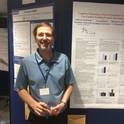Presentation
SLRF presentation overheads.rtf
Second Language Research Forum
(1999)
Abstract
a Comparison of the ROle of Aspect in native and non-native inference
generation in Narrative comprehension
The acquisition of English aspect, as opposed to tense, and the information provided by it on the text/discourse level have received increasing attention in recent years (Bardovi-Harlig 1997). At the same time, our understanding of native speakers’ cognitive processing of aspect during text comprehension is sketchy (Magliano & Schleich 2000). The current study compares native and non-native readers’ processing of the effect of aspect on understanding simple narratives. This comparison will allow addressing the question whether English language learners in this study make form-meaning connections similar to those made by native speakers.
The domain of aspect in natural language is complex and elusive. Aspect presents the time structure of events as opposed to tense, which locates events in time. The imperfective aspect in, for example, “Pat was eating the apple” partially focuses the process of eating, while the perfective aspect in “Pat ate the apple” expresses the entire event from beginning to end (Smith 1997). Results from several experimental studies of native English speakers’ comprehension behavior will be presented using a comprehension model in which understanding occurs when readers infer the causal relationships between individual events in a text (Trabasso & v.d. Broek 1985). The studies show that, depending on morphological aspect and distance from antecedents, causal antecedents may be more or less available during comprehension and recall. Armed with these insights into the cognitive impact of aspect on native speakers’ short and long-term memory representation of texts, the results of a study into such an impact on low-proficiency college level non-native speakers of English will be presented. In a pilot study, it appeared that aspect does influence low-proficiency readers’ recall of causal links in narrative texts.
References:
Bardovi-Harlig, K. 1997. Narrative structure and lexical aspect. Studies in Second Language Acquisition.
Magliano, J., & M. Schleich. 2000. "Verb aspect and situation models." Discourse Processes, 29, 83-112.
Smith, C. 1991 and 19972. The parameter of aspect. Dordrecht: Kluwer.
Trabasso, T. and P. van den Broek. 1985. "Causal thinking and the representation of narrative events." Journal of Memory and Language 24, 612-630.
Keywords
- aspect,
- SLA,
- text comprehension,
- causal inferences,
- ESL
Disciplines
Publication Date
1999
Location
Minneapolis
Citation Information
Andreas Schramm. "SLRF presentation overheads.rtf" Second Language Research Forum (1999) Available at: http://works.bepress.com/andreas-schramm/1/
